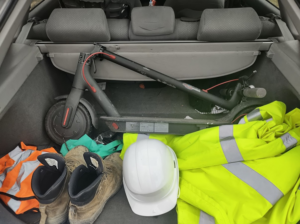Transport Emissions
Transport is one of our biggest sources of emissions. Our EU carbon emission reduction targets of 50% reductions by 2030 and net zero by 2050 are incompatible with our high and rising car use.
E-Scooters as Part of the Solution
Its currently illegal to use e-scooters on public roads in Ireland but that’s set to change and the UK are trialing public e-scooter hire to exist in all the major European cities including Oslo, Paris, Barcelona, Rome, Madrid, Athens and many more.
The use of e-scooters should be encouraged and will play an important role in the decarbonisation of transport.
The latest NTA national household travel survey shows that 50% of trips in Ireland are less than 5km and 36% are less than 3km.
Electric scooters are ideal for these short trips especially when road networks are congested and scooting confers a speed advantage.
They also have some advantages over bicycles; they are smaller, lighter and more portable. This means they can be more easily used for trip-chaining and multimodal transport, by for example carrying the scooter with you on the train, tram or placing it in the luggage compartment on a bus. It allows car users to park at the periphery of the city or town and travel the remainder of the way on a scooter thereby avoiding congestion.

The scooters portability allows it to be carried inside home or at the destination and eliminates the security concerns that can arise from bicycles being locked outside.
Generally, e-scooters are limited to a top speed of 25km per hour and have a motor of only 250 Watts (the same as an electric bicycle). They can be purchased for around €500 which makes them a very economic form of transport.
Why are E-Scooters Illegal?
Ireland defines an electric scooter as a mechanically propelled vehicle in law, and therefore an operator using the scooter on the road requires tax and insurance.
That sounds quite reasonable until you find out that it is not possible to tax or insure e-scooters or electric skateboards. This is because they do not fall under any existing vehicle category, so you cannot tax or insure them, and there is no separate license category for them.
It is unlikely that while drafting the Road Traffic Act 1961, electric scooters were on mind of the people who wrote the definition of a mechanically propelled vehicle.
The Road Traffic Act 1961 defines a ‘mechanically propelled vehicle’ as: “means, subject to subsection (2) of this section, a vehicle intended or adapted for propulsion by mechanical means, including a bicycle or tricycle with an attachment for propelling it by mechanical power, whether or not the attachment is being used, a vehicle the means of propulsion of which is electrical or partly electrical and partly mechanical, but not including a tramcar or other vehicle running on permanent rails;” Section 38 of the Road Traffic Act 1961 specifies that a person shall not drive a mechanically propelled vehicle in a public place unless they are in possession of a driving licensing appropriate to that vehicle.
An Garda Siochana have backed up that position by seizing electric scooters from commuters on the streets of Dublin and bringing riders to court. A Garda statement says: “Any users of such vehicles in a public place must have insurance, road tax and a driving license; As it is currently not possible to tax or ensure e-scooters or electric skateboards, they are not considered suitable for use in a public place. There is no anomaly within the law.”
Possible Change on the Horizon
Thankfully, this looks set to change. Following a consultation in 2019, the Minister of Transport, Eamonn Ryan announced that he was bringing forward a Bill to legislate for e-scooters.
The Road Traffic (Amendment) (Personal Light Electric Vehicles) Bill 2021 is now at the second reading stage and it proposes to limit electric bikes and scooters to 25km/h and limit the power supplied by the electric motor to 250 Watts. It also makes it an offence to hold a mobile phone while operating these “personal light electric vehicles”. It also makes it an offence to de-restrict the motor on the scooter or electric bike to go faster than 25km/h. The bill restricts the users to those 16 and older also gives the Minister power to make further regulations regulating the use of “personal light electric vehicles”
The bill can be viewed at –https://data.oireachtas.ie/ie/oireachtas/bill/2021/28/eng/initiated/b2821d-p-c-sent.pdf
Are E-Scooters a Good Thing?
It all depends on what the comparison is. Is a scooter journey replacing a walking journey? In that case there may be many reasons why a walking journey might be better, the frontrunner being public health. However, if the scooter journey is replacing a car journey then it is clearly preferable from a congestion, safety, resource use, climate emissions, noise, and air emissions point of view.
Downsides of Scooters?
They are unpopular with pedestrians when they are operated on the footpaths. Electric scooters, like bicycles have a distinct speed profile that makes them too fast to comfortably share with pedestrians on footpaths, and too slow to comfortably share the carriageway with cars. Bicycle/scooter lanes are needed.
What’s Needed?
A high-quality network of safe segregated cycle/scooter tracks is needed to allow low emission alternatives to the car. This should be rolled out in all our urban centers to facilitate short trips outside our cars and reduce our carbon emissions, improve air quality, and reduce noise.


